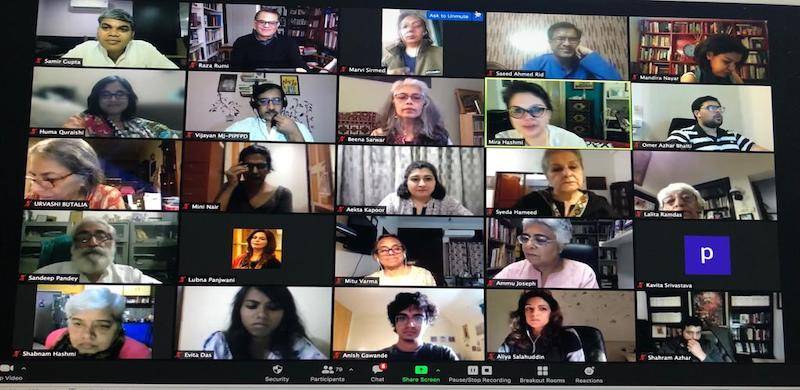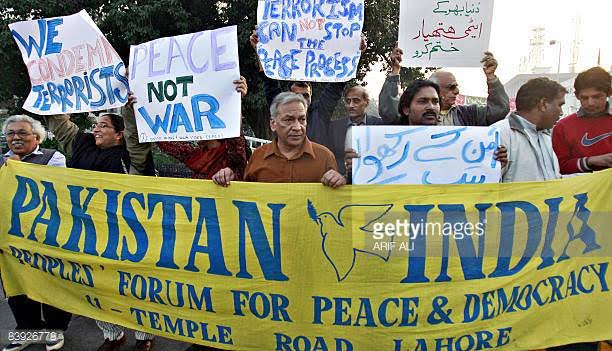
In order to reignite the hope of peace and initiate people to people dialogue, South Asia Peace Action Network (SAPAN) held its first conference on the 28th of March. Welcoming the exchange of letters between Prime Ministers Modi and Khan, the Peace action network pledged to bring together groups and individuals working for peace on the same platform.
The 2010’s, unfortunately, can be rendered as decade of turbulent Indo Pak relations, not least because of populist right wing politics in India and a prevalent institutional imbalance in Pakistan.
The conference brought together people across time zones into a virtual brainstorming session, which was underpinned by one overarching theme: Take forward the work of peace activists and giants like Dr Mubashir Hasan, Asma Jahangir, Kuldip Nayar and Nikhil Chakravarty.
On the all important matter of Kashmir, participants argued that Kashmiris must be granted a right to self determination. It was noted that the issue must not be restricted to a territorial dispute between India and Pakistan, as PIPFPD had been saying since its first Joint Convention 1994. Speaking at the conference, renowned journalist and editor NayaDaur analysed, “There is conflict reporting, but we haven’t placed enough emphasis on peace journalism."
Long before the advent of social media, the Pakistan India People’s forum for peace and Democracy (PIPFPD) engaged in cross border, grass roots contact which is unthinkable in this era of Indo-Pak polarisation. The objective of the forum was to facilitate common people in both the countries to listen to voices on peace over belligerent rhetoric to meet long term goals of regional cooperation, demilitarisation and resolution of the Kashmir question. It would come as a surprise to younger generation that this forum held joint conventions in New Delhi, Peshawar, Lahore, Bangalore, Calcutta, Karachi, Allahabad since its inception in 1994 untill 2011.
The conference reinforced the importance of trade for both countries, adding that it will make common people better off. The chairperson of the infamous PIPFPD and former member of India’s Planning Commission, Dr Syeda Hameed, said while speaking at the conference “It is heartening that the talks have started to reopen trade. “There is an umeed ki kiran (ray of hope) on the horizon.” Veteran peace activist, Jatin Desai, former General Secretary of Pakistan-India Peoples’ Forum for Peace and Democracy added “Things are moving ahead. It is a very important moment and we must take advantage of it."
The conference’s agenda shed light on how to bring people on both sides of the political spectrum into the conversation on peace, engage youth and ensure peacemonger groups across the region come under one umbrella to urge governments to enable people to people contacts. “There is a need to place the India Pakistan into a regional context’, said Beena Sarwar, senior journalist and editor of Aman ki Asha, a platform launched in 2010 by major media groups, on each side of the border.
Participants agreed that the Covid-19 pandemic has accentuated the need for better cooperation between both countries on public health. Participants also emphasised the need for urging both governments to normalise relations, allow increased movement of people and goods across borders. “We need to broaden the peace constituency by bringing people together, learning from each other on issues that affect us and that have potential to change our future”, said Ravi Nitesh, co-founder of the youth group Aaghaz-e-Dosti.
Noted participants in the March 28 discussions included Dr Syeda Hameed, human rights activist Rita Manchanda, artist Salima Hashmi, labour activist Karamat Ali, author Urvashi Butalia, women’s rights activist Sheema Kermani, KavIta Srivastav of India’s People’s Union for Civil Liberties, PIPFPD secretary Vijayan M.J., Sanjoy Hazarika of the Commonwealth Human Rights Initiative, Magsaysay awardee Dr Sandeep Panday, editor Kashmir Times Anuradha Bhasin Jamwal, and former Indian Navy chief Ramu Ramdas (also a Magsaysay awardee), and activist Lalita Ramdas.
The 2010’s, unfortunately, can be rendered as decade of turbulent Indo Pak relations, not least because of populist right wing politics in India and a prevalent institutional imbalance in Pakistan.
The conference brought together people across time zones into a virtual brainstorming session, which was underpinned by one overarching theme: Take forward the work of peace activists and giants like Dr Mubashir Hasan, Asma Jahangir, Kuldip Nayar and Nikhil Chakravarty.
On the all important matter of Kashmir, participants argued that Kashmiris must be granted a right to self determination. It was noted that the issue must not be restricted to a territorial dispute between India and Pakistan, as PIPFPD had been saying since its first Joint Convention 1994. Speaking at the conference, renowned journalist and editor NayaDaur analysed, “There is conflict reporting, but we haven’t placed enough emphasis on peace journalism."
Long before the advent of social media, the Pakistan India People’s forum for peace and Democracy (PIPFPD) engaged in cross border, grass roots contact which is unthinkable in this era of Indo-Pak polarisation. The objective of the forum was to facilitate common people in both the countries to listen to voices on peace over belligerent rhetoric to meet long term goals of regional cooperation, demilitarisation and resolution of the Kashmir question. It would come as a surprise to younger generation that this forum held joint conventions in New Delhi, Peshawar, Lahore, Bangalore, Calcutta, Karachi, Allahabad since its inception in 1994 untill 2011.

The conference reinforced the importance of trade for both countries, adding that it will make common people better off. The chairperson of the infamous PIPFPD and former member of India’s Planning Commission, Dr Syeda Hameed, said while speaking at the conference “It is heartening that the talks have started to reopen trade. “There is an umeed ki kiran (ray of hope) on the horizon.” Veteran peace activist, Jatin Desai, former General Secretary of Pakistan-India Peoples’ Forum for Peace and Democracy added “Things are moving ahead. It is a very important moment and we must take advantage of it."
The conference’s agenda shed light on how to bring people on both sides of the political spectrum into the conversation on peace, engage youth and ensure peacemonger groups across the region come under one umbrella to urge governments to enable people to people contacts. “There is a need to place the India Pakistan into a regional context’, said Beena Sarwar, senior journalist and editor of Aman ki Asha, a platform launched in 2010 by major media groups, on each side of the border.
Participants agreed that the Covid-19 pandemic has accentuated the need for better cooperation between both countries on public health. Participants also emphasised the need for urging both governments to normalise relations, allow increased movement of people and goods across borders. “We need to broaden the peace constituency by bringing people together, learning from each other on issues that affect us and that have potential to change our future”, said Ravi Nitesh, co-founder of the youth group Aaghaz-e-Dosti.
Noted participants in the March 28 discussions included Dr Syeda Hameed, human rights activist Rita Manchanda, artist Salima Hashmi, labour activist Karamat Ali, author Urvashi Butalia, women’s rights activist Sheema Kermani, KavIta Srivastav of India’s People’s Union for Civil Liberties, PIPFPD secretary Vijayan M.J., Sanjoy Hazarika of the Commonwealth Human Rights Initiative, Magsaysay awardee Dr Sandeep Panday, editor Kashmir Times Anuradha Bhasin Jamwal, and former Indian Navy chief Ramu Ramdas (also a Magsaysay awardee), and activist Lalita Ramdas.
